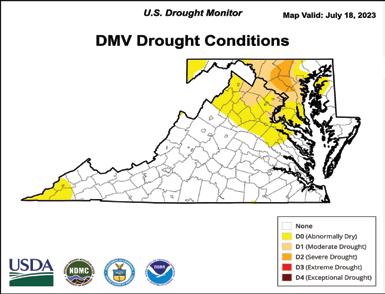
3 minute read
EARTH OUR
WHAT ON (OUR) EARTH IS GOING ON?
July Roundup: Planet Roasts on the Hottest Days Ever Recorded
By Kayla Benjamin WI Climate & Environment Reporter
Between the insane heat and the intermittent return of wildfire smoke from Canada, this July has given folks in the District lots of reasons to stay indoors. A few reminders as we head into the last months of summer:
• Heat is one of the most deadly forms of extreme weather: take it seriously! Drink plenty of water; stay in air conditioning when you can; wear loose, light clothing; and use sunscreen.
• We’re likely to see more smoky days this summer: check the “Air Quality Index” section on your weather app whenever you check the temperature or the chance of rain—if it’s above 150, avoid any strenuous outdoor activity if you can; consider reducing time outside or wear an N95 or KN95 mask.
• Check in on unhoused neighbors, as both heat waves and air quality issues may hit them hardest. If you’re looking for a way to help, frozen water bottles are a good option.
Now, to this month’s environmental news!
IT’S HOT EARTH SUMMER: GLOBAL AVERAGE TEMPERATURES HIT NEW RECORDS
Typically, I try to start us off with local news, but the planet-wide story unfolding this month has been anything but typical. On July 3, the global air temperature (basically an average of all the temperature readings across the world) hit a record high. Then over the next few days, it kept getting hotter.
July 6, 2023 now holds the unofficial record for the warmest day recorded on Earth.
It’s unofficial because the dayto-day temperature records rely, in part, on computer modeling. But the fact remains: the world is getting warmer. A record-setting heat wave has enveloped the U.S. south over the last few weeks. The National Weather Service estimated that about 80 million people would experience a heat index higher than 105 degrees over the weekend of July 22. Here in the District, we’ve seen multiple days with a 97-plus degree heat index (the technical term for the “feels-like” temperature estimate, which factors in humidity) since Sunday.
The heat waves—which have affected large swathes of the globe, not just the U.S.—largely stem from two main factors. Firstly, burning fossil fuels like oil, gas and coal has released heat-trapping gasses into the atmosphere. This means that average temperatures have risen, and spikes of extreme heat have become more likely and more severe.
Secondly, the natural weather pattern El Niño formed early last month. The phenomenon, which typically occurs every two to seven years, will release heat stored in the Pacific ocean into the air.
D.C. COUNCIL MAKES MOVES ON LEAD PIPE REPLACEMENT
The Committee on Transportation and the Environment held a hearing July 6 to consider two bills aimed at speeding up the elimination of lead service lines in the District. The hearing came just a week after DC Water announced its updated Lead-Free DC Plan—which came with a $1.5 billion price tag, nearly tripling the agency’s 2021 cost estimate for the program.

The agency also said in the update that it now thinks the District has around 41,000 lead service lines (the pipes that connect water mains to the pipes inside buildings) in the ground, which is a 50% increase from its previous estimate. The Lead-Free DC Plan, which the agency first announced in 2019, aims to eliminate all lead service lines in the District by 2030.
DC Water has replaced just over 2,600 lead service lines over the last two fiscal years, said Will Elledge, the agency’s director of engineering and technical services.
“We're not even close to hitting a 2030 goal at this pace,” said Councilmember Charles Allen, who chairs the Committee on Transportation and the Environment.
The bills introduced by Councilmembers Janeese Lewis-George and Brooke Pinto both aim to speed up the process by making all lead pipe replacements free and mandatory. They also contain provisions for a free water-filter program while the replacements are completed. The committee is likely to combine elements of both bills before voting on it and presenting a final version to the Council as a whole.
‘SEVERE’ DROUGHT CONDITIONS LINGER IN SWATHS OF MARYLAND

The Maryland Department of the Environment urged residents and businesses to voluntarily limit their water usage on July 10 as the agency issued a drought watch affecting 10 counties in western and central Maryland. The watch comes in response to abnormally low water levels in streams and groundwater sources, the agency said.
Parts of the state have been experiencing what the U.S. Drought Monitor defines as “severe drought” for at least five weeks. Even after storms dumped heavy rain on parts of the DMV region throughout the beginning of July, dry conditions have lingered. That’s mostly because the rainfall has been somewhat spotty, hitting some areas hard and leaving others completely untouched, according to WBAL-TV reporting July 21.
The District and much of Northern Virginia are now experiencing “moderate drought,” according to the Monitor. WI
DC FUTURES is a new program that gives District residents up to $8,000 for college tuition. Students can choose from more than 50 in-demand fields.
Other benefits include:
• One-on-one coaching to help keep you on track.

• $1,500 stipend for books, travel, and other extras.
• Emergency funds to cover some of life’s unexpected expenses, such as car repairs, rent, food, and child care.
So, whether you want to finish the degree you started, or start the degree you’ve always dreamed of, the first step is just a click away.
Learn more at osse.dc.gov/dcfutures.









